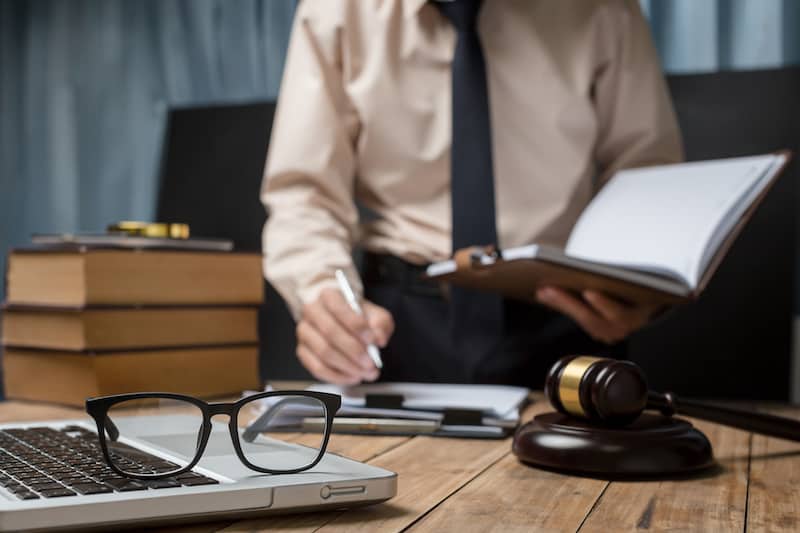
17 Aug The Hidden Mystery Behind Why Depositions Take So Long
Understanding Why Depositions Take So Long
For many individuals, the thought of participating in a deposition fills them with dread and anxiety. When you are asked to participate in a deposition, you likely have many questions floating around your head.
Why do depositions take so long? The main reason why depositions are so long is that lawyers need to make sure that they ask the right questions in an order that will maximize efficiency. Otherwise, you might feel like your lawyer is beating around the bush when all he’s trying to do is get straight answers out of you! More importantly, attorneys may need some information about what happened before, or if somebody who knows something had experienced this themselves so then their questioning becomes even longer as well.
One of the best ways you can help the lawyer get the session over with quicker is by giving them a strict time limit for asking you questions. This means that the lawyer will only be able to ask you the number of questions they previously agreed upon. Set a specific amount of time for how long the lawyer will be allowed to question you. An example would be, “You have 2 minutes to ask me any questions about my job, 3 minutes to ask me about what happened in the car accident, and 5 minutes total.”
When it comes time for your deposition, tell the lawyer exactly how much questioning time they have and stick to the plan! Once this has been established before the start of the session, there won’t be any problems later on down the road. The deposing lawyer will be more focused and will have a better understanding of how long they have to question you.
Depositions Are an Important Process
Depositions are a crucial and interesting part of the legal process. They provide litigators with an opportunity to question witnesses or parties without having judges present. For this reason, both sides can obtain information that would not be available during a trial where only one party can ask questions at any given time.
Depositions typically take place outside of court so that attorneys avoid being questioned by anyone who may know something about their case which could cause questioning sessions to last longer than required if it were taking place in front of another judge.
When you are deposed, you will be asked a series of questions unless the opposing attorney runs out of their allotted time to ask them all. If this happens your lawyer can’t ask any more questions no matter how important they may seem. Your lawyer should always have an idea about how much time they’ll need for questioning before agreeing to schedule the deposition because if it takes longer than expected then there could be a problem.
Oftentimes it is hard to estimate how long these sessions last and there are often several breaks so that everyone can relax and collect themselves when needed. It would be good if you had some snacks with you just in case since these things sometimes go on for hours at a time!
Limitations for Questions
The lawyer will ask you how many questions they can ask and give you a time limit in return. This time limit indicates how long they will be asking you questions. If your lawyer doesn’t stick to this time limit, it could mean that your case won’t go as smoothly and there could be a mistake in the questioning process.
It is best if a lawyer sticks to their word and gives you an appropriate time limit so that their deposition doesn’t go on forever and the truth can be found more easily.
The limitations of questions that lawyers may ask during a deposition are important to abide by to leave time for each question to be answered thoroughly. If you have more than what was originally allotted, there are ways in which this can be resolved as long as all other parties agree.
For example, if an attorney isn’t sure they will get through enough questioning before time runs out and does not want to take up too much courtroom space with their voice at trial while leaving some unanswered questions unasked that might end up hurting them down the line;
then it’s worth asking about extending your amount of questions so everything else stays fair for both sides.
Your Case Needs a Good Deposition
When it comes to depositions, it’s important to remember that the outcome of a case may rest entirely on what is said during this session. You and your personal injury lawyer must review the questions and answers that were asked at the deposition shortly after it takes place. Doing so will allow you to prepare for anything that might come up in court.
 If any details are missing or if there are any areas where things could be improved, please speak with your attorney about how best to handle these situations when they become relevant later on in your case. If you were not present during the deposition, it might be helpful to have someone in the room who can act as a witness and give testimony at court about what was said.
If any details are missing or if there are any areas where things could be improved, please speak with your attorney about how best to handle these situations when they become relevant later on in your case. If you were not present during the deposition, it might be helpful to have someone in the room who can act as a witness and give testimony at court about what was said.
In the past, depositions were only used when attorneys had doubts about a case. Nowadays, they are increasingly popular and can be considered before going into the trial. Depositions allow both parties to learn more information from each other without having to go through an entire court ordeal beforehand.
It is not nearly as scary if everyone knows exactly how things will take place and there are limitations on time for questions. If your answers could use some polishing up though just answer honestly like always. These details should help make everything easier for all involved!
Tips For Giving a Better Deposition
1.) Make sure you have all the questions in advance. This can be done by either giving them to your lawyer in writing before the deposition or by reading them aloud to the other attorney at the start of the deposition. If you change your mind, it is allowed as long as all parties agree on any changes.
2.) The opposing lawyer will not likely care if you don’t know an exact answer. Tell them that you don’t know for now and see if they have any follow-up questions for you. If the other party understands why limiting questioning might not be the best use of everyone’s time, ask to take a break beforehand so your team can consult with one another before answering more complicated or personal questions.
3.) It’s not worth it to volunteer information beyond the scope of what they ask unless you’re sure that will help your case. If a lawyer is being deceptive, he or she may twist words and make you seem like an untrustworthy person.
4.) You should follow your instinct and be nice! There are many ways you can do this. You could try to keep everything light-hearted during questioning or avoid asking too many personal questions that might make the other person uncomfortable without even realizing it. It is also important not to argue with lawyers. A long transcript can take away from what matters most: whether they were telling the truth when answering those same questions during their deposition.
Key to Getting Through a Deposition
The key to getting through a deposition with your sanity intact is being kind. Even if you’re feeling frustrated, the best way to get out of it in one piece is by staying calm and avoiding confrontation at all costs. One thing that many people forget about during these proceedings? Getting enough rest! The night before, try having an early dinner so that sleep comes easily without any tossing or turning later on.
tossing or turning later on.
If your deposition starts getting extended without knowing how long that will last, let opposing counsel know before they run out of their allotted questioning time. Doing so will allow them to decide whether it’s worth extending everything by twenty more minutes for everyone involved.
If you ask your lawyer if they can give you a better idea of how much time will be needed for questioning before setting up a deposition then hopefully that will make things easier for everyone involved. Some attorneys will call and ask for two or three hours, but rarely do any of these last that long. You need to keep your wits about yourself when dealing with strict time limits and keep focused on getting through the questioning before moving on!





